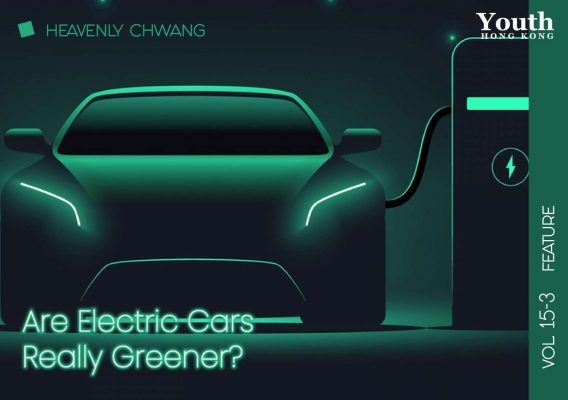//vol.15-3 Feature
Are electric cars really greener?
by Heavenly Chwang
What has the HKSAR government done to promote the use of EVs?
- Offer the first registration tax concession for EVs
- Improve public charging network and provide free EV charging services at government car parks
- Launch “EV-Charging Easy” Mobile App to help EV drivers locate available public chargers
- Encourage the installation of EV chargers among private sectors by launching a $2 billion “EV-charging at Home Subsidy Scheme”
- Support technological developments
In a nutshell, electric cars are greener compared to fuel-burning vehicles, especially during driving. However, if you look at the whole lifecycle emissions, including manufacturing and battery recycling, there are still environmental costs to be considered. So, the question of whether EVs are really greener is a complex one.
With an increasing social awareness of environmental issues, more people are seeking a greener living style. Replacing conventional fuel burning vehicles with electric vehicles (EVs) has become an option for those who wish to travel with less emission and pollution.
The demand of EVs has been booming, surging by 55% in 2022 year on year. While transportation, following the power industry, accounted for 20% of global emissions as the second-largest carbon emission sector in 2021, could EVs be the right answer to greener land transportation?
However, have you ever thought about why EVs are more environmentally-friendly? Isn’t electricity also generated by the burning of fossil fuel which emits greenhouse gases? In fact, there are several factors that make electric vehicles more environmentally-friendly than conventional vehicles.
High Energy Efficiency
While conventional vehicles require the burning of fuel and converting heat into motion, EVs convert electricity into motion straight away. An EV could be 70% more efficient from the moment you start the engine, as more than 40% of energy could be wasted to get the motor of a conventional car fully warmed up. Therefore, even though EVs consume electricity, the total emission and energy used for driving an EV are still less than that of traditional cars.
Zero Tailpipe Emissions
Although battery charging still emits carbon dioxide, EVs produce zero tailpipe emissions and exhausted gases on the road, providing a solution to roadside air pollution. On top of that, recent studies show that electric cars also produce less secondary particle pollution, which contribute to PM2.5 (particles smaller than 2.5 microns) and PM10 (particles smaller than 10 microns) pollution.
Reusing Brake Energy
Conventional vehicles waste energy as heat when braking, while EVs recover much of the energy through regenerative braking and store it in the battery for reuse. EVs can be two to three times more efficient than conventional vehicles when braking, thanks to their electric drive system and regenerative braking technology.
Powered by Renewable Energy
Unlike traditional cars powered by fossil fuel, EVs could be charged with sustainable and renewable electricity generated by wind power, solar power, bioenergy and hydroelectric, which further reduce its environmental impact.
But What About Batteries?
EV batteries which contain metals such as nickel, cobalt, lithium, and are mined at the expense of causing destruction, corruption and contamination of our fragile ecosystem and wildlife habitats. Additionally, recycling retired EV batteries is currently energy-intensive and costly, with limited local recycling facilities available. The pollution caused by disposing of batteries and the energy consumption of recycling should not be overlooked.
To conclude, EVs are generally more environmentally friendly than conventional cars when driving. However, a cradle-to-grave and cradle-to-cradle look at their whole lifecycle emissions reveals some environmental concerns. To maximize the positive environmental impacts of EVs, EV owners are suggested to lower their frequency of changing cars and make good use of renewable energy when charging their EVs.
With the continuous development of EVs and recycling technologies, it is expected that EVs will become more environmentally-friendly in the near future. ■
Sources:
- https://www.cnbc.com/2023/04/26/electric-car-sales-surged-by-55percent-in-2022-to-hit-over-10-million-iea.html
- https://www.statista.com/topics/7476/transportation-emissions-worldwide/#topicOverview
- https://www.epa.gov/greenvehicles/explaining-electric-plug-hybrid-electric-vehicles
- https://www.edfenergy.com/energywise/why-EVs-are-efficient
- EVRoadmapEng17_3.indd (eeb.gov.hk)
- Promotion of Electric Vehicles | Environmental Protection Department (epd.gov.hk)
- https://www.transportenvironment.org/discover/electric-vehicles-are-far-better-than-combustion-engine-cars-when-it-comes-to-air-pollution-heres-why/
- https://www.info.gov.hk/gia/general/202202/16/P2022021600224.htm
- https://www.td.gov.hk/en/public_services/licences_and_permits/vehicle_first_registration/new_frt_concessions_for_electric_vehicles_2018/index.html


